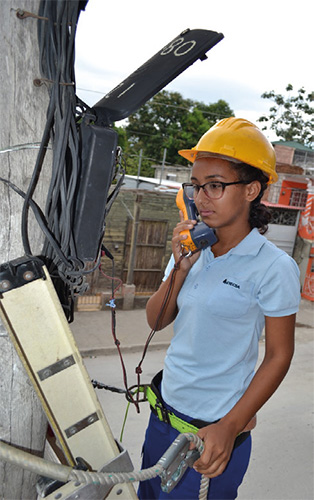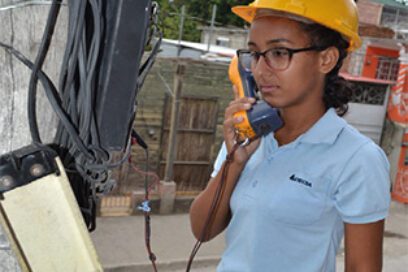
Darisbel Diéguez Peña is still called Dari at work. But she knows it is only a matter of time before the workers in the repair brigade of the Guantánamo telephone center give her a nickname: it is a ritual of the process of belonging, of being seen, in this case, as just another worker.
I had a hard time fitting in,» admits the 25-year-old. I started working in October and it wasn’t until two months ago, more or less, that I began to feel part of the collective, to ‘let myself go’, to relate better and to demand my spaces».
She rushes to clarify: «I just felt weird. In meetings, there is a sea of men and I am there. The same thing happens at work. I was also ‘cut off’ by how people looked when they saw us on the street, by what people would say».
Luckily, she did not anticipate the embarrassment she would face when she applied for the Etecsa repairer course, which was opened to both sexes for the first time in the province at the end of 2023.
«I remember I was cooking and my husband, who was busy surfing the Internet, told me there was a six-month course at Etecsa for girls with certain physical characteristics, age, disposition, which luckily I have,» she says.
What about the fear of heights, I ask. «It is the usual question, but the truth is that I have never considered it a problem. Maybe I’m from the countryside, from Puriales de Caujerí (San Antonio del Sur), and my father and grandfather were lifelong mountaineers.
She was not the only one. The call, she adds, was attended by about 40 girls who were explained the conditions of the work, the sacrifice, the danger. Four stayed. Two graduated. She started working.
«The course – which lasted from January to June 2024 – was very good. We had teachers who treated us with rigor, without differences. They told us: ‘Girls, it’s hard, but you have to do everything that is the responsibility of a repairman,’ and I appreciate that. By the way, I was second on the ladder because of the content and practices like hammering, which is a headache for many, but I do it very well.
What was or is the most difficult thing, I ask her: «Then and now: carrying the ladder, which requires strength and technique; handling the boots, which weigh a world; and waking up my son, who is 4 years old, every day at 5 a.m., because his father works in the sugar mill, in another community, and his mother comes in at 7:30 p.m.»
When I inquired about her motives, her face changed and the young woman, with a slight figure – in the uniform designed for men, fitted at the waist and with legs that end in a pair of boots, although they are not, they seem too big – confessed to me that the first thing she thinks of, before climbing a pole or exposing herself to danger, is her son.
«It is a risky job where I have to focus on not hurting myself or others. For his sake, I strive to make sure that up there – and she points to the tangle of cables a few meters above – everything is done safely and with a cool head,» she says.
But below that is life and its stereotypes. How do you deal with them? I go back to the charge.
«At Etecsa I try to be on an equal footing and I don’t accept that they make it easy for me. I am a repairwoman and I have to do a lot of carrying, a lot of repairing, a lot of climbing on poles.
And what others say on the street doesn’t affect me. What is important is my family, my husband, my colleagues, and they support me.
«I also feel that people are surprised when they see me, but I also motivate them. Once a girl asked me several times if I was a woman, and then she stayed with me and asked me many questions; and more than one girl has approached me to be interested in the courses», says the one who, without discussion, is the first operator repairer installer of Etecsa Guantánamo, although she certainly will not be the last.


